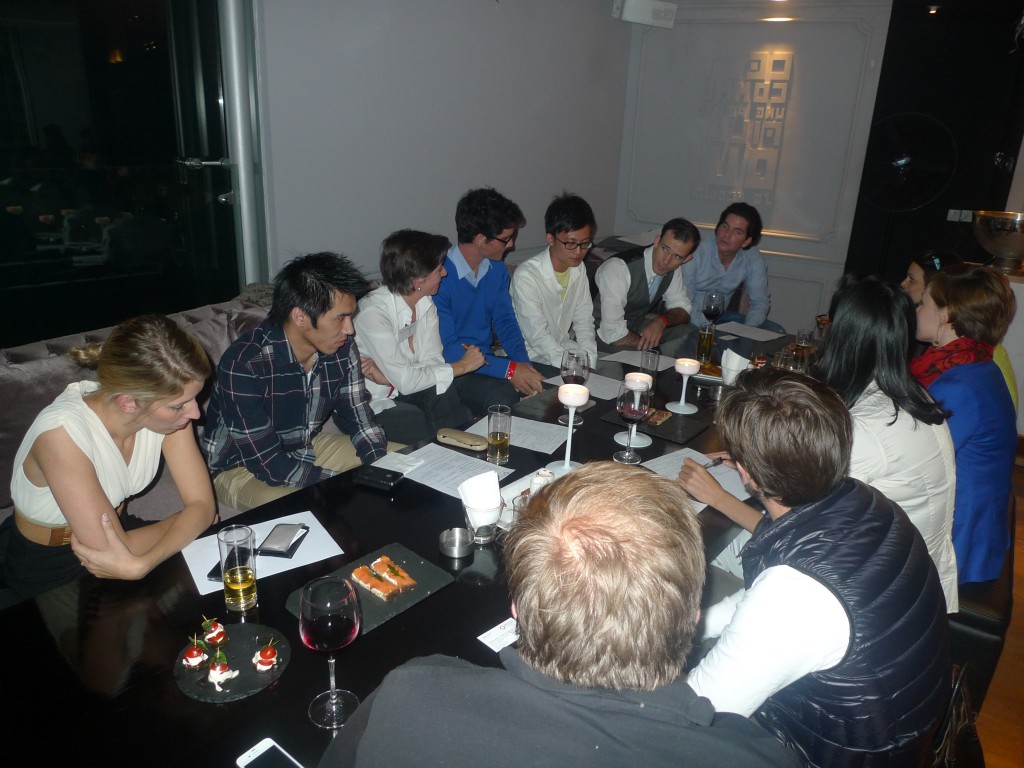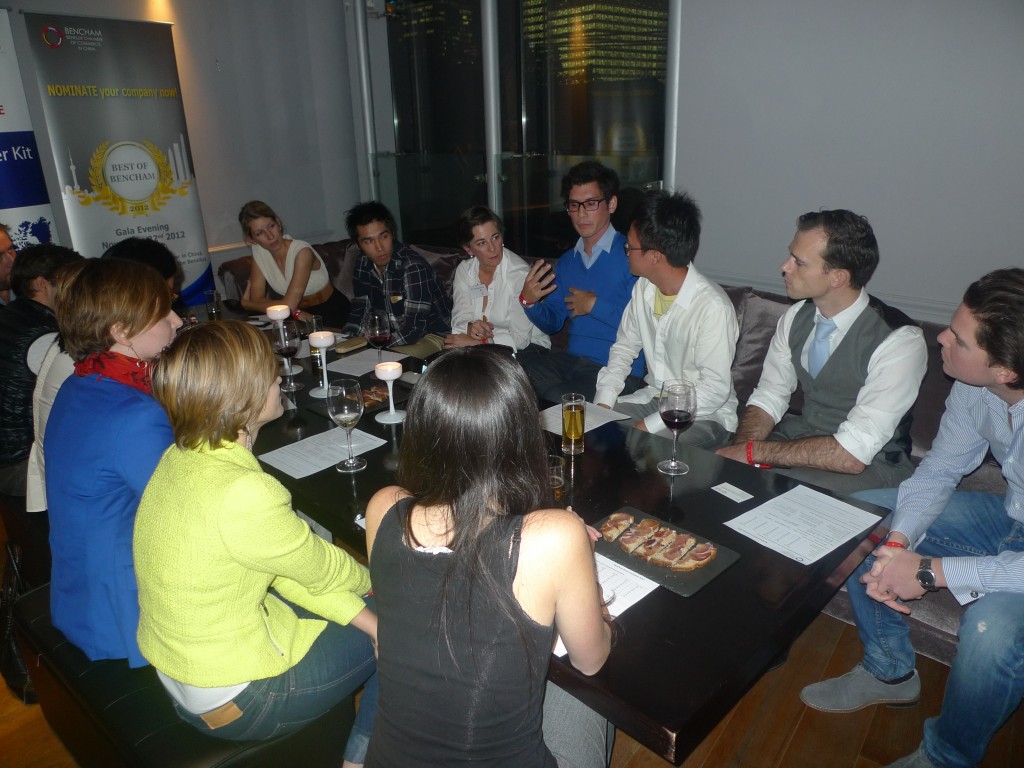Young Bencham Shanghai entrepreneurs in quest for answers to difficult questions
Last week I was asked by the Young Entrepreneurs section of Bencham Shanghai to co-moderate a debate about intercultural challenges experienced by young businesspeople from the Benelux and their Chinese counterparts who work together on Chinese soil. Although it was envisaged that a balanced group of Chinese and Western nationals would attend this informal gathering at Kartel’s, a popular cocktail lounge and wine bar on Xiangyang North Road, the representatives of the Benelux far outnumbered the Chinese side.
 The challenges varied in depth and size, but on quite a few fronts Western entrepreneurs seem to face many of the difficulties that others before them also encountered and in some cases, still encounter. I list a few of the recognizable issues that were brought up and discussed.
The challenges varied in depth and size, but on quite a few fronts Western entrepreneurs seem to face many of the difficulties that others before them also encountered and in some cases, still encounter. I list a few of the recognizable issues that were brought up and discussed.
 In the multicultural office setting, motivating Chinese staff appears to be a significant daily conundrum for Belgian and Dutch bosses. Acting independently and being adept in the field of problem solving is something they are keen to instill in their Chinese employees. Meanwhile, hanging on to staff continues to be problematic – the promise of a juicy bonus is not necessarily the only carrot that can tempt someone to stay on. Another feature that brings puzzlement and incredulity to the fore is the difficulty in managing factory suppliers’ take on orders. Placing new orders that differ only so slightly in design are sure to put a break on the process: every change, regardless of how slight, generates a new batch of paperwork as if the order is placed for the first time. Ordering different specimen of samples in small quantities, for say packaging purposes, often means long waiting times.
In the multicultural office setting, motivating Chinese staff appears to be a significant daily conundrum for Belgian and Dutch bosses. Acting independently and being adept in the field of problem solving is something they are keen to instill in their Chinese employees. Meanwhile, hanging on to staff continues to be problematic – the promise of a juicy bonus is not necessarily the only carrot that can tempt someone to stay on. Another feature that brings puzzlement and incredulity to the fore is the difficulty in managing factory suppliers’ take on orders. Placing new orders that differ only so slightly in design are sure to put a break on the process: every change, regardless of how slight, generates a new batch of paperwork as if the order is placed for the first time. Ordering different specimen of samples in small quantities, for say packaging purposes, often means long waiting times.
A stressful element in ‘doing business in China’ is the uncertainty around meeting deadlines: timekeeping and delivery on the agreed date can be a surprise right up till the very end. If uncertainty around delivery dates can be nerve wrecking from time to time, nothing appears to be so difficult as finding the right business partner. The risk of falling into the hands of someone with less noble intentions can be difficult to suss out and may only become clear on the day it is too late! Finding protection from the Chinese legal system can be all too haphazard and may fail to bring justice. And, to what extent are young foreign businessmen taken seriously by their older employees and suppliers?
On the other side of the spectrum one Chinese businessman stressed the difficulty in communicating his Dutch boss’s wishes to the Chinese manufacturer. In his line of work, describing the kind of new materials his team needs to the factory director can cause not just a little misunderstanding and frequent unwanted delays. In addition, getting his sometimes impatient colleagues to understand the Chinese way can prove to be a challenge too – indeed, Chinese too need to feel their way forward. And this lies at the heart of the matter.
One always needs to be careful in making sweeping generalisations, certainly in a market that is changing so rapidly and is as dynamic as the Chinese one. But I was struck by the candidness of these young men and women, open to reflection and a desire to understand their Chinese counterparts. Coming up with solutions that lead to new ways of looking and judging the existing system, a system in which people with crucially differing cultural backgrounds live and work, is essential in bringing these worlds together.
China is on a roller coaster of discovery, on a myriad of fronts. It requires for foreigners to adopt a flexible approach in which time is invested in getting everyone in the chain involved – hence investing time in the relationship with the management of a factory can very well lead to more accurate delivery times. By providing information on how their products are used, by whom and how, may provide the steppingstone to greater involvement on the manufacturer’s part. Explaining how products are judged by European buyers gives an insight into the framework in which the quality of products are sold. Working with samples, photographs, possibly video clips could help in painting a fairly complete picture. It’s certainly worth a try!
 In a market where quality staff is on the move in search of better pay, companies are bound to experience difficulties in keeping the good one’s on board. Paying ever higher salaries simply is not an option. Opportunities to make a career within the business is par for the course for any ambitious person, maybe even more so in China. Providing training, foreign travel and the chance to become part of senior management have proven to work. Smaller companies and start-ups however may not be able to provide that pallet of opportunities at first and may find themselves suddenly understaffed and left in the lurch. There are no easy answers to deal with these circumstances. Keeping one’s ear close to the ground and building up a neat little list of potential candidates may work in one case but not the other. Relationship-building should never be forgone and can be vital in the search for new valuable staff.
In a market where quality staff is on the move in search of better pay, companies are bound to experience difficulties in keeping the good one’s on board. Paying ever higher salaries simply is not an option. Opportunities to make a career within the business is par for the course for any ambitious person, maybe even more so in China. Providing training, foreign travel and the chance to become part of senior management have proven to work. Smaller companies and start-ups however may not be able to provide that pallet of opportunities at first and may find themselves suddenly understaffed and left in the lurch. There are no easy answers to deal with these circumstances. Keeping one’s ear close to the ground and building up a neat little list of potential candidates may work in one case but not the other. Relationship-building should never be forgone and can be vital in the search for new valuable staff.
The evening debate (on 18 October 2012) was organised by Bencham Shanghai’s Young Entrepreneurs, with special thanks to Stefanie Candela and Steven Li. Co-moderated by Lilian Kranenburg of ChinaMoves and Ching Ping Au of Your-Op.





3 Responses to “Young Bencham Shanghai entrepreneurs in quest for answers to difficult questions”